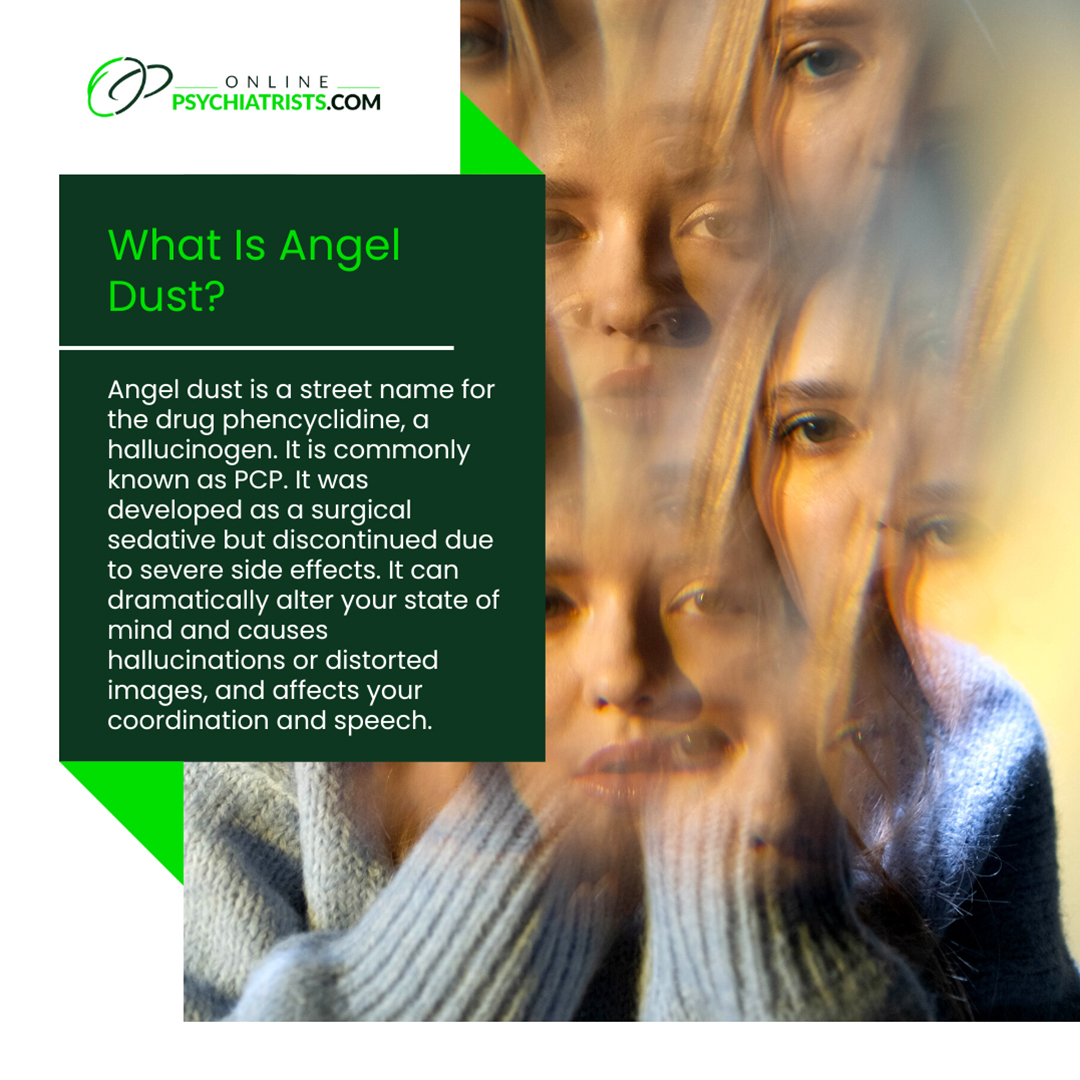

Drugs are chemicals that affect the body and the brain. Some effects of drugs can be long-lasting and permanent and even continue after you stop taking the substance. Angel dust is one such drug that can affect your mental, emotional, and physical well-being. If you were taking angel dust or PCP, as it is commonly known, and worried about its psychological dependence, craving, and compulsive PCP-seeking behavior, get medical help. Visit Online Psychiatrists for the best advice and support regarding your health and condition. Dr. Zlatin Ivanov comes up with a treatment plans that focus on your well-being and comfort and offers empathy and care to ensure you enjoy an improved quality of life.
Angel dust is one of the several drugs known as hallucinogens. It can also work as a stimulant, an anesthetic, or a painkiller, depending on how much has been taken. It is considered a dissociative drug, as it leads to distortion of sights, colors, sounds, self, and one's environment.
Once used for medicinal purposes like anesthetics or pain relief treatments, this powerful psychedelic substance is now a recreational drug whose effects range from feeling sluggish to being compelled to fight the world uncontrollably. It has been classified as a Schedule II controlled substance which means it poses a high risk for abuse and may lead to dependence, as well.
Read more: PTSD Examined: The Five Types Of Post Traumatic Stress Disorder
Angel dust is a street name for the drug phencyclidine, a hallucinogen. It is commonly known as PCP. It was developed as a surgical sedative but discontinued due to severe side effects. It can dramatically alter your state of mind and causes hallucinations or distorted images, and affects your coordination and speech.
Also known as a peace pill, dust, ozone, embalming fluid, or rocket fuel, it is available as a white powder, which is snorted or mixed into a liquid. It is also used in pill form, and some people sprinkle it on leafy substances like mint or marijuana to smoke.
If you or someone you love has a substance use disorder involving dust, seek immediate medical assistance. It is illegal for the general population to make, take or sell angel dust. You can get the best possible help and support for your substance use and look forward to a healthy life.

Angel dust is a powerful psychedelic or mind-altering substance. It can change the perception of what is real and what is not, lead to vivid hallucinations, and has mood-altering effects that can impact you mentally, emotionally, and physically. You may feel high, which is different for everyone. It can mean feeling happy or euphoric, energized, reflective, and meditative, but it comes at the risk of greater instability.
Using angel dust can result in a range of symptoms, including:
It is important to note that not everyone taking angel dust will experience the same symptoms as it manifests differently in different people. While it may make some people feel good, others may feel bad. There is no way to influence its outcome.
Also, the side effects of angel dust depend on how much you take. The higher the dosage, the more severe the side effects will be.
Whether you take angel dust in powder form, tablet, or injection, it comes with several risks. You cannot know beforehand what you will see, hear, or experience and how it will affect you.
Effects may include:
Higher doses can also result in:
Many people turn to hallucinogenic drugs like angel dust to experience a detached state, deal with stress, or experience what they believe is a heightened sense of being. Taking a large dose can lead to an overdose and increase the risk of dangerous, aggressive, or violent behavior. At times, people taking this drug to escape reality end up feeling worse.
Large doses or long-term use of angel dust or PCP can cause convulsions or permanent damage to the brain. It can even lead to coma and death. Even a small dose mixed with alcohol or some other drugs can lead to coma. Also, if you take PCP intravenously, it increases your chances of contracting illnesses such as Hepatitis and HIV.
Yes. Like many other substances, angel dust has the potential to cause mental health issues. People with a history of mental illnesses should be careful when taking PCP, as it can worsen their preexisting symptoms. Anxiety and depression are the most common mental health issues caused by PCP.
Long-term use of PCP can also result in serious mental health issues, including:
Some of these effects are so severe that they last a lifetime, even if you stop taking the drug. You should seek medical help if you or someone you love is addicted to angel dust to prevent its lasting effects.
Read more: 5 OCD Treatment Options To Consider
The long-term effects of angel dust or PCP are not really well understood. It can cause several physical and psychological symptoms that often increase in intensity with larger doses. Research shows that extended use of PCP and other dissociative drugs can lead to drug tolerance and a potential substance use disorder that includes signs of withdrawal when drug use is stopped.
It can also interfere with several other substances, and repeated use can cause tolerance and several long-term effects. It is best to seek professional guidance if you are concerned about your substance abuse.
Treatment is available for anyone having trouble with angel dust. As it is a dangerous drug with potentially deadly effects, it needs careful medical treatment combined with support and care to ensure healing.
Treatment for angel dust is the first important step toward reclaiming your life. Dr. Zlatin Ivanov focuses on offering relief from the chaos and confusion substances can cause. He aims to target issues resulting from angel dust use.
Treatment options include:
Angel dust is an addictive substance, but recovery is possible with the right support. People who want to break free from chemical dependence and improve their life can look forward to counseling and therapy to recover from their addiction.
If you are worried about substance use and want guidance, seek immediate professional attention to prevent life-threatening consequences. Substance use can result in short and long-term negative health effects. They can be physical and mental, ranging from moderate to severe, depending on the substance you are taking.
Call Online Psychiatrists today to schedule an appointment with Dr. Zlatin Ivanov and start your healing journey. Dr. Ivanov offers addiction treatment as well as other solutions for mental health issues. He ensures you regain your ability and energy to see the beauty of life and enjoy it in the best possible way.

Dr. Zlatin Ivanov, MD, is an adult psychiatrist specializing in addiction treatment, ADHD, anxiety, depression, and OCD. He offers exceptional talk therapy and medication management through online video conferencing.
Dr. Ivanov is double board certified in Psychiatry and Clinical Neurology and a member of the American Psychiatric Association. His medical career is colored by many outstanding contributions to medicine, including several publications, research, and scientific presentations. An attending psychiatrist at Woodhull Medical Center in Brooklyn, NY, and Bellevue Hospital Center in New York City, he takes the time to listen to patients and makes sure they know he is committed to their unique situation.
 Our Locations
Our Locations
The Chrysler Building
405 Lexington Ave, #2601
New York, NY, 10174 (map)
300 Carnegie Center Drive #150K,
Princeton, NJ, 08540 (map)
701 Brickell Avenue, 1550#A,
Miami, FL, 33131 (map)